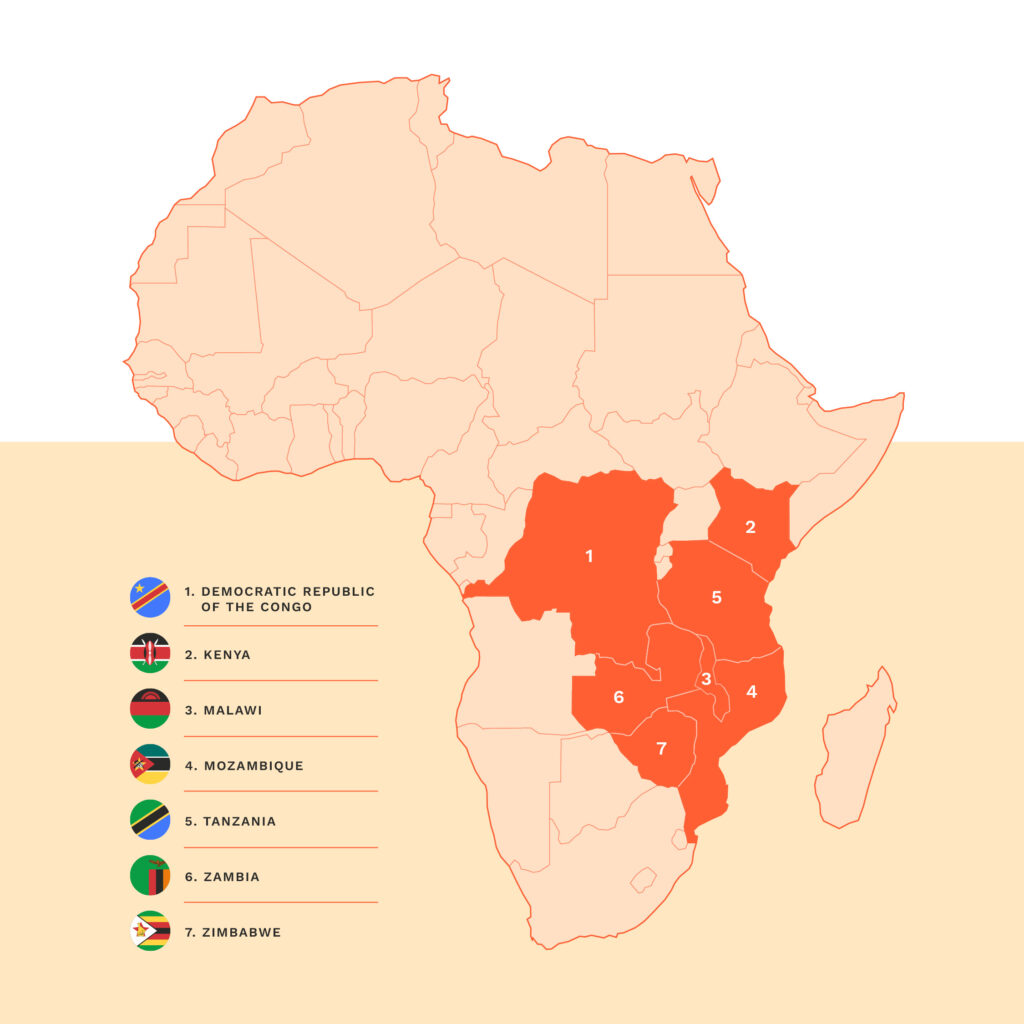Where we work and our projects
The MCFA programme is supporting clean cooking market development in seven Sub-Saharan African countries.
The MCFA programme is supporting clean cooking market development in seven Sub-Saharan African countries.
The Modern Cooking Facility for Africa (MCFA) is supporting projects in seven Sub-Saharan African countries: the Democratic Republic of the Congo, Kenya, Malawi, Mozambique, Tanzania, Zambia and Zimbabwe and currently has a portfolio of 14 projects.

In the beneath table you can see an overview of all MCFA agreed projects by September 2024, which are under implementation in all seven project countries.
| Financed companies | Partners | Country | Technology | Number of contracted clean cooking services | Project description |
|---|---|---|---|---|---|
| Lanforce Energy | Zimbabwe | Biogas | 6,131 | Lanforce Energy is one of the leading biogas companies in Zimbabwe offering biodigesters for households, farmers, entrepreneurs and institutions. The company aims to scale up its business activities by selling approx. 2,400 new biodigesters, which would total over 6,000 clean cooking services, expected to benefit up to 28,000 Zimbabweans in the rural and peri-urban areas of the country. | |
| BURN Manufacturing Kenya | BURN Manufacturing USA | Kenya | Electric | 130,000 | Under separate agreements with BURN subsidiaries in the respective countries, MCFA will provide up to EUR 10 million of results-based financing |
| BURN Manufacturing Mozambique | Mozambique | Electric | 66,666 | until 2027 to expand access in the Democratic Republic of the Congo, Kenya, Mozambique, Tanzania and Zambia. | |
| BURN Manufacturing RDC | DRC | Electric | 50,000 | With the support of MCFA, BURN is planning to establish up to 456,000 clean cooking services | |
| BURN Manufacturing TZ | Tanzania | Electric | 130,000 | and enhance its direct operational presence across the five targeted markets. | |
| BURN Manufacturing Zambia | Zambia | Electric | 80,000 | Over the course of the anticipated four-year implementation period, the expansion is expected to reach up to 2.28 million beneficiaries. | |
| Emerging Cooking Solutions | Zambia | Solid biofuels (pellets) | 28,666 | Emerging Cooking Solutions will offer to over 28,000 customers micro-gasification stoves together with its own SupaMoto pellets, made from timber mill off-cuts from managed forestry plantations, under a subscription-based utility model. | |
| ENGIE Energy Access Zambia | Good Farmland Management Kenya (Sistema.bio) | Zambia | Biogas | 2,392 | ENGIE Energy Access Zambia Limited has been operating in Zambia since 2017 with a focus on delivering off-grid solar home systems. The company will leverage its extensive reach and Sistema.bio’s adaptable product range, to bring biodigesters to 2,400 households in Zambia. |
| ENGIE Energy Access Moçambique | Good Farmland Management Kenya (Sistema.bio) | Mozambique | Biogas | 2,000 | ENGIE Energy Access Mozambique will provide its customers with innovative biodigesters that enable farmers to convert agricultural waste into biogas and fertiliser through a PAYGo business model. The company aims to provide 2,000 clean cooking services, i.e. stoves and biodigesters, benefitting some 10,000 people in Mozambique by the end of 2028. |
| Sayari Safi (UpEnergy Tanzania) | Tanzania | Electric | 123,250 | UpEnergy Tanzania aims to scale up its distribution of electric cooking services across Tanzania in Dar es Salaam, Dodoma, Morogoro, Mwanza and Pwani. The aim is to deploy over 123,000 PowerUp electric pressure cookers, which are expected to benefit over 600,000 Tanzanians. | |
| HomeBiogas | Kenya | Biogas | 34,000 | HomeBiogas in Kenya will provide small-scale farmers in Kenya with its modular small-scale biogas systems. The company aims to install 34,000 biogas systems to boost the company’s expansion in Western and Central Kenya. This will provide up to 170,000 farmers in Kenya with clean cooking solutions | |
| Better Cooking Company Limited | Kenya | Solid biofuels (pellets) | 25,000 | Better Cooking Company Limited, trading as EcoSafi, will provide Kenyans with efficient cooking stoves of their own design and a regular supply of pellet fuel made from agricultural waste. The company aims to establish 25,000 sustainable clean cooking services in Kenya. This will provide up to 125,000 people in Kenya with access to clean cooking solutions. | |
African eCosync Energy | Kenya | Solid biofuels (pellets) | 13,000 | ACE Hybrid Energy Kenya will sell its own-designed ACE One gasifier stoves to customers on Kenya’s Eastern coast. The company aims to sell 13,000 stoves, which will provide up to 65,000 people in Kenya with clean cooking solutions. | |
| ENGIE Energy Access Tanzania | Good Farmland Management Kenya (Sistema.bio) | Tanzania | Biogas | 2,700 | ENGIE Energy Access Tanzania will provide customers in provinces with the highest concentration of dairy farmers with an innovative biodigester technology through a PAYGo business model, enabling them to convert agricultural waste into biogas and fertiliser. The aim is to provide 2,700 clean cooking stoves combined with 1,600 biodigesters in various sizes, benefitting some 13,000 people in Tanzania. |